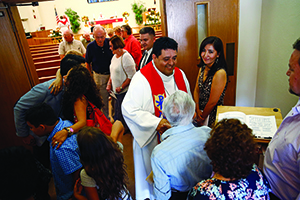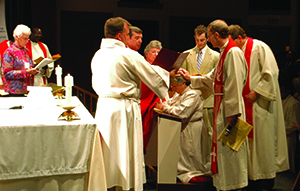Pastors and congregations live in transition. Congregants come and congregants go. Pastors arrive and pastors leave. In some contexts this is more common than in others, and it’s worth noting that there is a vocational push these days to encourage pastors to stay with a parish for a while. (For more on this topic, check out the “Slow Church” movement at www.patheos.com/blogs/slowchurch.)
But even if a pastor stays for many years at a particular parish, it’s more likely than not that at some point parishioners and clergy will experience the anxiety, pregnant joy and hand-wringing expectation that comes with calling a new minister.
So let’s imagine that your parish has just said goodbye to a pastor, even one who is dearly beloved, and has now welcomed someone new. She’s in, she’s had her first Sunday, and now you’re wondering, “What’s next?”
Based on my experience, here are five things that happen when a new pastor arrives.

They were pastors: Sadi Omar Vila (left) was ordained in April 2015 and serves as associate pastor of Shepherd of the Glades Lutheran Church, Naples, Fla.
1. New people show up.
They will. The new pastor will speak to new people who don’t know or remember the last minister, and they will make this new pastor their own. She is their pastor. When you talk about “Pastor So-and-So’s way of doing things,” they won’t know the reference. They will desire, and start, new traditions. They’ll spark some change, even as they hope for and create friendships with longtime members who loved the way things used to be.
When a new pastor comes, so do new people. This transition will require the congregation to love Christ enough to welcome the stranger and risk taking a chance on new ideas from new people.
2. Some people will leave.
We don’t like to talk about this, and we don’t like to think about this, but it’s true.
Perhaps they’re leaving because the previous pastor’s departure gives them the freedom to also move on after being heavily involved. Perhaps they’ve been on the margins of the community anyway, and this allows them to step away quietly. Perhaps they’re longtime members who just can’t get on board with the new pastor and his way of doing things.
No community stays stagnant forever. There will be a temptation by the new pastor and the congregants to want to keep these people by hook or crook, but sometimes this just needs to happen for one reason or another. This particular transition will require trust, honesty and the ability for the congregation to love people enough to let them go if they have to leave.

Cinda Brucker ordained in 2010, serves Trinity Lutheran Church, Hughesville, Pa.
3. Worship will change.
Your previous pastor had that folksy charm. This new minister has a love of icons, pulpit preaching and wants to talk about moving that Saturday night service to Thursday night. Whatever the change may be, worship will be different. Sometimes this is welcome news, and sometimes this will cause deep anxiety.
The old adage that a pastor should never change anything in the first year is not wisdom. While no pastor should tailor services solely to his or her preference, worship will evolve somehow to reflect the strengths of the presider.
The community will have to be honest with one another and the new pastor while not being obstinate or obstructionist. After all, worship is more about God than the individual in the pew or the body in the pulpit.
4. New life will spring forth.
It will. Probably in unexpected places. The new pastor will bring his or her own hopes, ideas and energy to new and existing programs and projects. New life will certainly spring up. The congregation must be adaptable, embracing these new sprigs of life and harnessing this energy to spur on ministry in other areas.
5. You will love each other, by God.
This last one is the most important, of course. When given the time and space to be free and honest with one another, and when they are intent upon living together in community, the congregation and pastor will, by God, love one another. Since that is the second greatest commandment, it should be a priority.
If gossip, hard hearts, unrelenting egos and ambition get in the way, this fruit of the new relationship will surely whither on the vine. But when we give each other the authority and space to welcome new people, let people go, embrace godly change and encourage new life, love will grow and flourish and infect the church like a mustard weed, allowing the gospel to take root.
The call of the church is not just the pastor’s, and the church is not primarily the parishioners’. It is God’s call; it is God’s church. We just enjoy the responsibility and joy of stewarding both.
This, then, becomes the role of the pastor and the congregation when a new call is taken: stewardship. Both must look to steward well — not by force or by ego, not by demanding uniformity or being unwilling to change, but by seeking out the God who draws people together so they might go out in mission for the life of the world.




